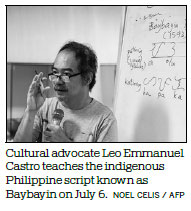Ancient script revival spells debate
MANILA - With deliberate golden strokes, artist Taipan Lucero proudly brings an ancient script back to life in the hope of promoting an endangered but contentious part of Philippine heritage.
Once confined to history classes, Baybayin, a 17-character indigenous script used before Spanish colonization, is making a comeback among the nation's millennials, young professionals and diaspora.
Even as technology renders writing by hand outdated, online clips of calligraphy and digital fonts for the script have gripped the smartphone generation and now Baybayin - last used hundreds of years ago - is appearing on everything from tattoos and T-shirts to mobile apps.
Proponents hail the curvilinear text as a crucial part of Philippine identity, but in a country with 131 government-recognized languages - critics say investing in the promotion of one ancient text over others is controversial and impractical.

"It's bittersweet. It made me proud knowing our ancestors were literate," said Lucero, who studied calligraphy in Japan but returned home to apply his skills to reviving Baybayin.
"What's sad about this is what's being propagated in our education system. It's like our history started with being colonized by Spain," the 31-year-old added.
Baybayin was the form of writing used before the Spanish arrived in 1521. Missionaries learned it initially to spread Catholicism before forcing locals to adopt their Roman alphabet, historians said.
Its resurgence has prompted calls from some for a law declaring Baybayin the national script. But regional scholars say the text is important mainly to Tagalogs - the people historically based in and around the capital - rather than to all Filipinos.
Advocates said reviving Baybayin will provide an antidote for a nation grappling with its past and is a way of celebrating indigenous history.
Many are proficient in English because of the US occupation - Spain ceded control to the United States in 1898 - and the Philippines only became independent in 1946.
"It's a great achievement to invent our own writing system," said Leo Emmanuel Castro, executive director of cultural group Sanghabi.
"Our language is gender-neutral. Professions and pronouns have no sex whereas English is very sexist," he added.
The campaign to bring Baybayin to the mainstream advanced in January when the lower house passed a bill mandating its use in signs and educational materials. It stalled in the Senate but the proposal has been introduced again in the new session that started in July.
But the practicalities of bringing a historic script into modern use, teaching it in schools, and honing it to fit places of work and 21st century life, may be the biggest challenge.
"It will just be a novelty, for display," said Joselito Delos Reyes, professor of creative writing and popular culture at Manila's University of Santo Tomas.
"It won't be a platform for communication," he added, saying lawmakers should instead prioritize improving education infrastructure and teachers' salaries.
Agence France-presse
(China Daily Global 08/01/2019 page7)


















